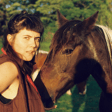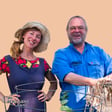
One Billion Ways To Make Life Better with Brett Cooper
*Recorded outdoors under a passionfruit vine with wind in the banana leaves*
This is one of those conversations that’ll shake you up, rattle your cage and light a fire under your butt to make change – because today’s guest reckons we need to upskill, now! It might just be the greatest pep talk in Reskillience history, from one of the most passionate permies in the movement. It’s Brett Cooper from Limestone Permaculture.
Brett, his wife Nici and fam live on Worimi Country, mid-coast NSW. Not too long ago their one acre block was just grass and hoofprints in a sleepy little rural town. Now there are over 550 fruit and nut trees, 80-140 chooks, ducks and turkeys, veggies galore, herbs, medicines, outdoor classrooms, 4.4 million litres of stored water and one legendary pizza oven. Oh, and some bangin’ community resilience.
Over three million viewers have devoured Brett + Nici’s farm tours on YouTube, pointing to more than just a fetish for gardening content but a deep yearning for the health, abundance and connection that overflows at Limestone Permaculture.
🧙♀️ LINKY POOS 🧙
Or peruse their upcoming events
Central Vic permie calendar
4 Day Residential Permaculture Retreat with David Holmgren, Beck Loew + Su Dennett ~ November 1 - 5
The Rocklyn Ashram PDC ~ Feb 2025
Good stuff we mentioned
Book: Roots Demystified ~ Robert Kourik
Book: Earth Restorer’s Guide to Permaculture ~ Rosemary Morrow (currently on sale at Permaculture Principles!)
Book: Permaculture A Designer’s Manual ~ Bill Mollison
Book: Permaculture One ~ Bill Mollison + David Holmgren
Eastern NSW



















